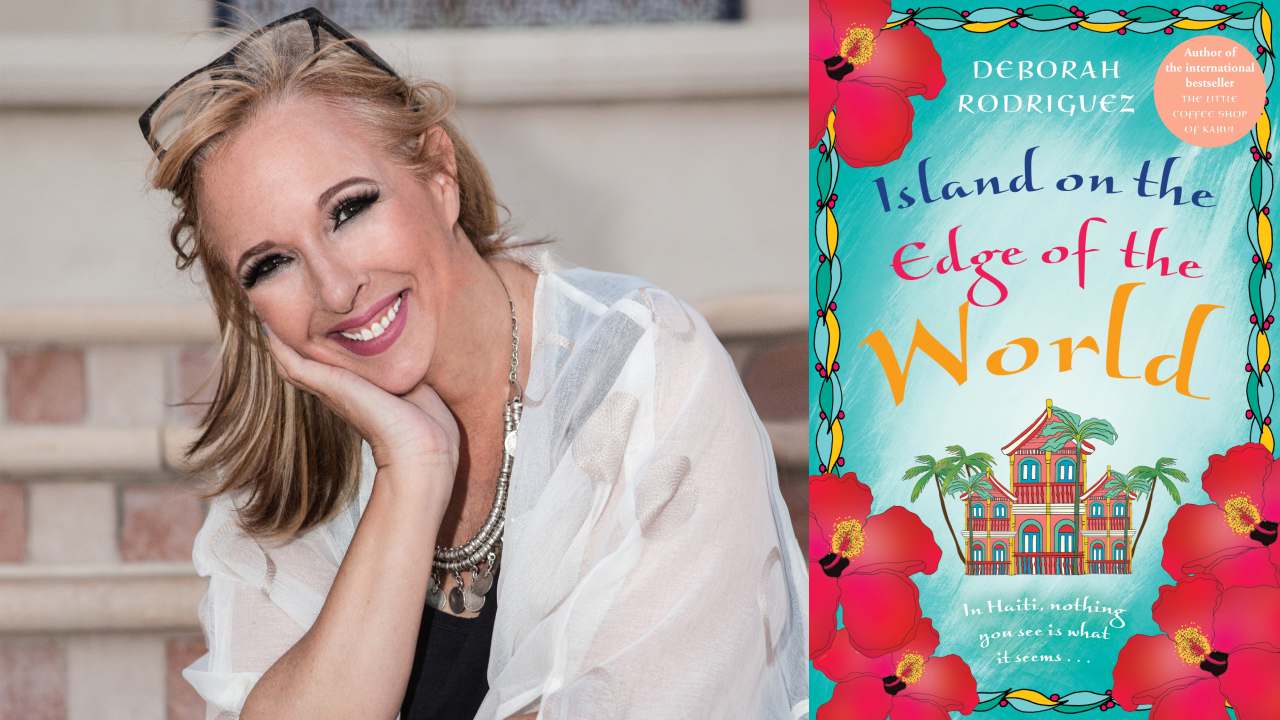5 minutes with author Deborah Rodriguez

In 5 minutes with author, Over60 asks book writers about their literary habits and preferences. Next in this series is Deborah Rodriguez, a writer, hairdresser and business owner based in Mazatlán, Mexico. She has written two fiction bestsellers – The Little Coffee Shop of Kabul and Return to the Little Coffee Shop of Kabul – as well as two memoirs about her life in Afghanistan and America. Her latest novel, Island on the Edge of the World, is out now.
Over60 talked with Rodriguez about her life as a grandmother and spa owner, her unconventional writing routine, and the reads she recommends.
Over60: What is your best writing tip?
Rodriguez: Just write. Write from your heart. Don’t pay attention to spelling or punctuation, just get lost in your stories. Practice getting them out of your head, letting them flow down to your fingers and onto the keyboard. Don’t put it off. Tell your story, and tell it proudly.
I struggled in school with spelling and punctuation. I still battle with it, and am very thankful for spell check and punctuation apps. When I was in school, I had a teacher discourage me from taking a writing class. I had many stories and I wrote all the time, recapping my days in a journal. But this teacher thought I would be better suited for art than for writing. I loved art and still do, but it was a shame that I had that choice made for me. I almost let that teacher take away my storytelling. I wish he had said, “Creative writing would be excellent for someone like you, who seems to have a lot to say.”
What book do you think more people should read?
That’s a tricky question. Any of my books, of course! But seriously, to me, it’s books that open our eyes and our hearts to other cultures that I feel are always “should-reads”. It’s hard for me to pick just one book, but I can share with you a couple of my favourites. What I am enjoying right now is In Arabian Nights: A Caravan of Moroccan Dreams by Tahir Shah. I’m really enjoying these stories about past and present Morocco. One of my favourite books is The Hummingbird’s Daughter by Luis Alberto Urrea. I could read this book over and over. It’s a mystical drama of a young woman’s sudden sainthood in late 19th century Mexico. I live in Mexico, near the area where the book takes place, and the book just captured me from beginning to end.
How have the places you travelled to influenced your writing?
The places I’ve travelled and the cultures I’ve experienced have greatly affected all my books. There is not one moment when I am travelling that I am not weaving stories in my head. I have never vacationed well, because I’m always trying to peek behind the curtains.
What was the last book that made you cry?
I am working on my next book, which takes place in Morocco, so I’m reading all things Moroccan. I recently picked up a book that I first read 18 years ago, Stolen Lives: Twenty Years in a Desert Jail by Malika Oufkir. I was horrified at this true story of imprisonment and escape. It is impossible to read this book and not weep.
Do you have a writing routine? If so, what does it look like?
My life is a little crazy, as I still run a small spa in Mexico, not to mention my duties as a mother and grandmother. So I write whenever I can find the time. What may be somewhat unique about my process is the development stage. I start with a thought, I choose an appropriate (and interesting) location, and then I travel. I talk to everyone I meet along the way, and keep my ears open to everything. If I’m lucky, I come home with a novel in my head!
Who is your favourite literary character, if any?
One of my favourite literary characters is Liesel from The Book Thief. Of course I admired her resilience and bravery, but mostly I identified with her desire to keep books close to her. Even when she was still illiterate, she could feel their power and the need to protect them. She’s literally a “literary” hero.
Which author, deceased or living, would you most like to have dinner with?
I would like to have dinner with J.K. Rowling. It’s not hard to be impressed with this woman, but I have a new level of respect for her now. During the writing of Island on the Edge of the World, which deals with the issues surrounding the orphanages of Haiti, I learned that Rowling is the founder and president of the international non-profit organization Lumos, which works to end the institutionalisation of children globally, and ensure that all children grow up in a safe and caring environment. I would love to have dinner with her to thank her for taking on such a massive job of promoting family preservation.
What trope grinds your gears? Alternatively, is there a cliché that you can’t help but love?
One trope that really irritates me with that the bad guy always wears black. I am a hairdresser and hairdressers always wear black.
I live in Mexico, where there are a lot of Canadians who spend winter in my town. The first time I heard the saying “I’m off like a dirty shirt”, I thought, “What?” It means you are finished with something, and leaving quickly. I now try to use it whenever I can.
